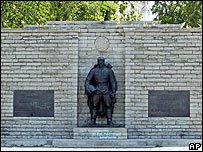With the Catholic baggage I think in the end the Latino vote will eventually move right but for the meantime I think Neumann-Ortiz is correct, the Republicans are in trouble if they keep trying to tap the xenophobic vote.
The power of Latino turnout
By CHRISTINE NEUMANN-ORTIZ
The Latino community demonstrated its capacity to not only turn out in great numbers to recent marches but in its participation in the 2006 elections.
Though it is not getting play on English-language news stations, immigration politics motivated Latinos to vote and give the Democratic Party the majority in Congress.
The Republican Party delivered this victory to the Democrats through its commitment to a political platform that was seen by the Latino community as extremist, anti-immigrant and racist.
In the debate over immigration, the Democratic Party distinguished itself by having a majority in the party that supported comprehensive immigration reform that was pro-family, supported civil and worker rights and provided a path to citizenship instead of a path to criminalization.
In the 2004 elections, Republicans got 44% of the Latino vote and Democrats got 53%. Latinos had voted for Democrats by margins of 63%, 62% and 65% in the 1998, 2000 and 2002 elections, respectively.
This year, according to exit poll figures reported by CNN's Spanish-language network, the Republican vote among Latinos crashed to 26% and the Democrats got 73%, a full 20-point improvement from 2004.
This could represent a seismic shift in ethnic electoral politics for 2008 and beyond.
At the local level, Voces de la Frontera noticed even before the elections a new level of increased participation. The No. 1 reason: immigration.
The Milwaukee Election Commission reported that in the 10 wards with high Latino population in which Voces de la Frontera organized a non-partisan get-out-the-vote campaign, there was an average of 48% increased participation compared to the 2002 elections.
According to Marilyn Figueroa of Voces de la Frontera, "This was the most historic campaign I have seen compared to other elections because of the level of unity and motivation on the part of the Latino community. It crossed all kinds of lines: age, class, national origin such as naturalized citizens from Mexico, Puerto Ricans, Colombians, Cubans, Panamanians, Peruvians and other countries from Central and South America."
There was an inspiring show of participation on the part of these naturalized citizens to stand up for the rights of other immigrant families.
There was a great participation of young people who voted for the first time and helped assist others as well. Eleazar Lopez, Antonia Lara and Eddie Perez of Citizen Action, three young adults who led the local campaign on Milwaukee's south side, noted how important the contribution of young people was to this effort.
Lopez said, "We were able to educate the community about the importance of participating in the political process so that they would have the confidence and knowledge to vote and have their voice heard by politicians, both Democrat and Republican."
The election results represent a more favorable opportunity for comprehensive immigration reform, but they do not represent a final victory. There are powerful corporate interests that profit from denying immigrant workers full rights and that stand to profit from the increased detention and militarization of the border.
The Latino community does not want a return to the Bracero program that was dismantled for its labor abuses. We do not want a guest worker program that would only legalize the super-exploitation of immigrant labor for the employer.
It will be the efforts of the Latino community to continue educating, organizing and mobilizing to demand justice that will result in a comprehensive reform that reflects compassion, humanity and democratic values.
The Latino community expects our political leaders who were voted into power to deliver now that they are in a position to move a comprehensive immigration reform forward.
Just as other ethnic and racial minorities have organized to claim representation and equal rights in this country, voter turnout is a recognition of the vitality of the growing Latino civil rights movement that is not just capable of marching but of mobilizing for elections and is determining its future.
Christine Neumann-Ortiz is director of Voces de la Frontera.
Monday, November 20, 2006
Subscribe to:
Post Comments (Atom)

No comments:
Post a Comment